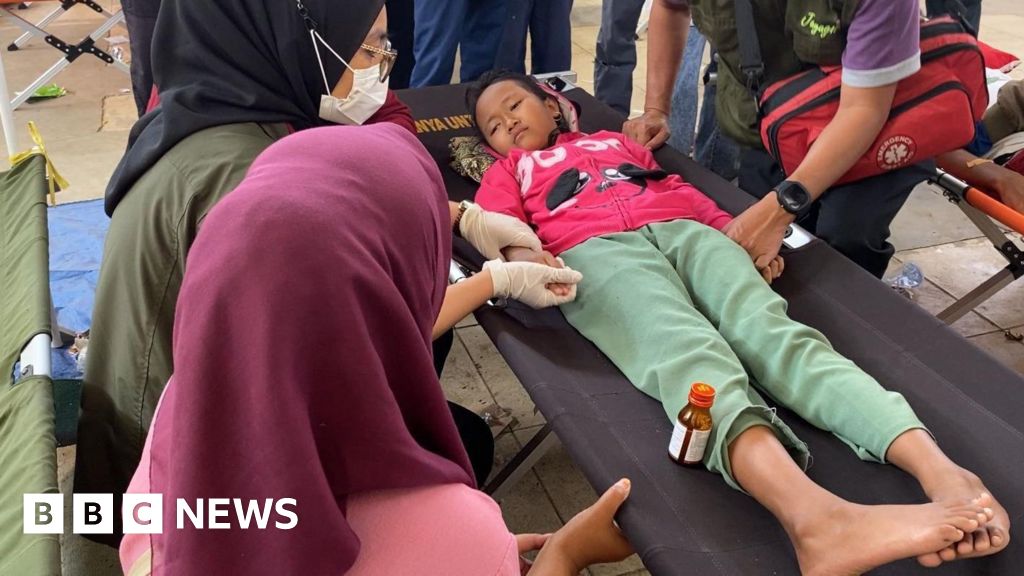Health
Over 1,000 Indonesian Children Ill from Contaminated School Meals

More than 1,000 children in Indonesia have fallen ill after consuming contaminated free school lunches this week, prompting urgent calls for action from health authorities. The latest incident, reported between Monday and Wednesday, involved a total of 1,171 victims in West Java, specifically linked to President Prabowo Subianto’s multi-billion-dollar nutritious meals programme aimed at providing free lunches to schoolchildren across the country.
Yuyun Sarihotima, head of the Cipongkor Community Health Center, confirmed the figures to BBC Indonesia, following a previous incident last week where 800 students in West Java and Central Sulawesi also reported food poisoning symptoms. This programme, which intends to serve 80 million children, has become a focal point of concern amid a series of food safety violations.
The symptoms reported by the affected children include stomach aches, dizziness, and nausea, alongside more atypical signs such as shortness of breath. Previous cases have suggested that negligent food preparation practices are likely contributing factors. This week’s meals, which included soy sauce chicken and fried tofu, are under scrutiny, especially since past food poisoning incidents have been linked to expired ingredients.
Government Response and Health Concerns
Dadan Hindayana, head of Indonesia’s National Nutrition Agency, stated that the recent food poisoning in Cipongkor stemmed from a technical error within the Nutrition Fulfillment Service Unit (SPPG). As a result, operations in the area have been suspended. West Bandung Regent Jeje Ritchie Ismail labeled the mass poisoning in Cipongkor as “an extraordinary event,” emphasizing the need for a swift and comprehensive response.
The National Narcotics Agency (BGN) reported that from January to September 22, there were 4,711 cases of food poisoning related to the free school lunch programme, with the majority occurring on the island of Java. However, the Indonesian Education Monitoring Network (JPPI) has recorded a significantly higher number, reporting 6,452 children affected as of September 21. JPPI National Coordinator Ubaid Matraji indicated that the government should declare an outbreak and temporarily halt the programme for thorough evaluation.
Proposals to alter the programme have emerged, suggesting that funds be distributed directly to parents so they can prepare meals for their children. The BGN has previously dismissed this idea, highlighting the ongoing debate about the effectiveness of the current programme.
The Broader Context of the Programme
Despite the recent health crises, President Prabowo’s free meals initiative is a central element of his leadership strategy, aimed at addressing malnutrition among children. The programme, projected to cost $28 billion, has garnered attention globally as one of the most expensive school meal schemes. In contrast, India’s comparable programme serves 120 million children at a cost of $1.5 billion, and Brazil’s version caters to 40 million students for a similar annual expenditure.
While there is recognition that programmes offering free meals can help improve health and educational outcomes, experts express concerns over potential mismanagement. Muhammad Rafi Bakri, a research analyst at Indonesia’s audit board, warned that large-scale social assistance programmes have historically been susceptible to corruption, noting, “this program is a goldmine for corrupt officials” given its extensive budget.
The free school meals programme was prominently featured during Prabowo’s presidential campaign in 2023, where he asserted that it would significantly help combat stunting—a condition affecting one in five children under the age of five in Indonesia. Since taking office in October 2022, Prabowo has seen his approval ratings soar to 80% following the implementation of populist policies, including the school meals initiative.
As the Indonesian government faces mounting pressure to address health concerns linked to the programme, the situation remains fluid, with potential implications for both public health and political stability in the months ahead.
-

 World5 months ago
World5 months agoSBI Announces QIP Floor Price at ₹811.05 Per Share
-

 Lifestyle5 months ago
Lifestyle5 months agoCept Unveils ₹3.1 Crore Urban Mobility Plan for Sustainable Growth
-

 Science4 months ago
Science4 months agoNew Blood Group Discovered in South Indian Woman at Rotary Centre
-

 World5 months ago
World5 months agoTorrential Rains Cause Flash Flooding in New York and New Jersey
-

 Top Stories5 months ago
Top Stories5 months agoKonkani Cultural Organisation to Host Pearl Jubilee in Abu Dhabi
-

 Sports4 months ago
Sports4 months agoBroad Advocates for Bowling Change Ahead of Final Test Against India
-

 Science5 months ago
Science5 months agoNothing Headphone 1 Review: A Bold Contender in Audio Design
-

 Top Stories5 months ago
Top Stories5 months agoAir India Crash Investigation Highlights Boeing Fuel Switch Concerns
-

 Business5 months ago
Business5 months agoIndian Stock Market Rebounds: Sensex and Nifty Rise After Four-Day Decline
-

 Sports4 months ago
Sports4 months agoCristian Totti Retires at 19: Pressure of Fame Takes Toll
-

 Politics5 months ago
Politics5 months agoAbandoned Doberman Finds New Home After Journey to Prague
-

 Top Stories5 months ago
Top Stories5 months agoPatna Bank Manager Abhishek Varun Found Dead in Well









